Ivan Allen College alumni share how they make an impact in the nation's capital.
The World Bank, the U.S. Senate, the U.S. Navy, and the National Climate Adaptation Science Center are just a few places where alumni from the Ivan Allen College of Liberal Arts make a difference every day in Washington, D.C.
We reached out to many of them to learn their favorite things about working in D.C., why they're passionate about making an impact, and how their Ivan Allen College education helped them get there.
What's the best part about working in Washington, D.C.?
Well, there may be some debate — simply because there are so many great qualities to choose from!
Andres Marcuse-Gonzalez, a recruiter at Democracy Fund, says, "without a doubt, the best thing about working in D.C. is the energy and purpose that everyone brings," while Adam Owens, Chief of Staff of Global Public Policy at General Motors, says the best part is “getting to watch history being made in real-time."
In addition, half of the alumni we spoke to said the people are what make D.C. great, while 30% mentioned the job and networking opportunities. Twenty-three percent cited the city's diversity and international community, and — not to be overlooked — 15% said D.C.'s food scene or free museums are some of their favorite things about living in the city.
"Having access to an environment with such a high density of dedicated individuals is a great opportunity to learn more about the issues you care about, share ideas for solutions, and develop your career goals," says Taylor Poole, an intelligence analyst at BSI Group. "Overall, D.C. is just a really inspiring environment for a young professional, particularly if you are interested in public service."

What degree do you need to work in Washington, D.C.?
Graduates of every school in Ivan Allen College find success in Washington, D.C. Just ask Emily Gibson Blevins, who earned an M.S. and Ph.D. in the History and Sociology of Technology and Science and now works as a technology and innovation policy analyst at the Library of Congress's Congressional Research Service.
“I'm fortunate to work in a field where I use the skills I honed as an IAC graduate student every single day,” Blevins said. “I'm constantly faced with complex questions that require thorough research, careful analysis, and clear written communication — all key components of the training you receive with an IAC degree.”
Sara Cronan, B.S. in Applied Languages and Intercultural Studies, is an advancement associate for prospect management at the Smithsonian National Air and Space Museum. “The tagline of Ivan Allen College during my time there was ‘Innovation at the crossroads of humanities, social sciences, and technology,’” she said. “Being a liberal arts student at an engineering school taught me how to thrive in this intersection — which is perfect for working at one of the Smithsonian's most visited STEAM-related museums!”
That said, a whopping 80% of the Ivan Allen College alums in D.C. that we spoke with have degrees from the Sam Nunn School of International Affairs or the School of Public Policy.
Usayd Casewit, who graduated with a M.S. in Energy and Environmental Policy, said his IAC degree "has been a springboard for career and personal growth.” He now works in D.C. as a program officer at The National Academies of Sciences, Engineering, and Medicine.
Whether you're looking to make a difference through non-profit work, global development, policy, government, education, or anywhere else in the nation's capital, your IAC degree can help you get there.
Check out how these alumni are making a difference in Washington, D.C.!
IAC Alumni Careers in Washington, D.C.

Avonne Bell
Director, Connected Life at CTIA
Read Avonne's Profile
M.S. Public Policy
1. What's the best part about working in D.C.?
I moved to D.C. directly after completing my master's degree in the IAC and have been here ever since. The DMV (DC, Maryland, and Virginia) metro area is vast and diverse, so there are a variety of options in terms of where to live, lots of interesting people, and professional opportunities.
2. What's the most impactful part of your job?
The most impactful part of my job is working on policy and legal issues at the cutting edge of technology. Many things I work on involve developing technologies, so there are no clear-cut, easy answers.
3. Why are you passionate about it?
I have always been interested in technology matters, and in this space, I am working on topics at the intersection of technology and policy. I feel like I am helping to shape the future of how we use and experience technologies and consider how we balance the value of innovation with broader public benefit.
4. How did your IAC degree prepare you for where you are now?
I always credit my experience at Georgia Tech, particularly my graduate research assistantship with the Center for Advanced Communications Policy, with helping set the path for my career. At the time I was pursuing my degree, there were not many programs focused on technology policy, and while the IAC school did not have that specific concentration, the combination of being at an engineering and technology school and the various courses and opportunities available allowed me to target my interest and focus my experience to issues related to the internet and telecommunications.

Elena Berger
International Relations Officer at the U.S. Department of Energy
Read Elena's Profile
M.S. International Affairs
Ph.D. Public Policy
1. What's the best part about working in D.C.?
The best part of working in D.C. is to be part of the U.S. Government and, in my case, to work in a science and technology-driven agency like the Department of Energy. I also live in D.C., don't have a car, and enjoy walking around this beautiful city.
2. What's the most impactful part of your job?
The most impactful part of my job is contributing and participating in the decision-making process of critical issues for the American people. In my case, they relate to the U.S. international cooperation in energy.
3. Why are you passionate about it?
I am passionate about it because I was born in Brazil and lived in France before moving to the United States 25 years ago. My international background, combined with my multidisciplinary education, helps me appreciate the benefits of international cooperation as one important approach to help us address the complex challenges of our planet.
4. How did your IAC degree prepare you for where you are now?
My IAC degrees in international affairs and public policy helped me acquire the knowledge and analytical skills to understand and appreciate these complex problems and propose approaches for potential solutions. My years as a graduate assistant at the School of Public Policy under the leadership of Professor Susan Cozzens were critical for acquiring experience in conducting policy research in a group environment.

Emily Gibson Blevins
Science and Technology Policy Analyst at the Library of Congress' Congressional Research Service
Read Emily's Profile
M.S. & Ph.D.
History and Sociology of Technology and Science
1. What's the best part about working in D.C.?
The free museums and events! D.C. is home to many of the nation's best museums, and the best part is — they are free!
2. What's the most impactful part of your job?
It's a privilege to serve Congress as a member of its own nonpartisan think tank. Through my work at the Congressional Research Service, I provide Congress with comprehensive research and analysis on a range of science and technology topics that is authoritative, confidential, and objective. I think it's vital for our nation's lawmakers to have access to this type of information throughout the legislative process.
3. Why are you passionate about it?
Supporting legislative work on science and technology policy is exciting! I continue to draw a tremendous amount of career inspiration from a somewhat obscure line in a possibly even more obscure book on the history of science in the federal government. In it, historian of science and technology, Hunter Dupree, wrote: "science has been a formative factor in making both the federal government and the American mind what they are today. The relation of the government to science has been a meeting point of American political practice and the nation's intellectual life." His words perfectly encapsulate what's so fascinating to me about the field of science and technology policy — it has long been and continues to be a key venue in which fundamental questions relating to American national identity and priorities are debated.
4. How did your IAC degree prepare you for where you are now?
I'm fortunate to work in a field where I use the skills I honed as an IAC graduate student every single day. I'm constantly faced with complex questions that require thorough research, careful analysis, and clear written communication — all key components of the training you receive with an IAC degree.
"The most impactful part of my job is working on policy and legal issues at the cutting edge of technology. Many things I work on involve developing technologies, so there are no clear-cut, easy answers."
— Avonne Bell
Director of Connected Life at CTIA

Scott Bray
Deputy Director of Naval Intelligence and Director of Naval Intelligence Activity at the U.S. Navy
Read Scott's Profile
B.S. International Affairs
1. What's the best part about working in D.C.?
To me, D.C. is the center of my professional universe. It's where policy is made, intelligence is delivered, and the national security apparatus pulls everything together. It's a place where you learn something new every day — and where there is a high concentration of dedicated professionals committed to public service. It's also filled with unique history and opportunities: no matter how many meetings I've attended at the White House, I still feel a sense of awe walking into the West Wing.
2. What's the most impactful part of your job?
In my current job, I'm responsible for the nearly 10,000 dedicated professionals in the Naval Intelligence Enterprise; several billion dollars in annual funding; all of the collection, analysis, and counterintelligence activities of Naval Intelligence; our foreign naval intelligence partnerships; and protecting our secrets from foreign intelligence entities. It's my responsibility to ensure that we're working on the right issues today to inform decisions that will be made tomorrow. Pulling all of that together to advance the national security interest of the United States is where I believe I have the most impact. At the same time, I always feel my impact the most when I get to touch the career of individuals and help them become even better professionals.
3. Why are you passionate about it?
The range of national security challenges the United States faces has grown significantly over the past decade: strategic competition with China, Russia's invasion of Ukraine, North Korea's nuclear and ballistic missile advances, and Iran's network of proxies that threaten regional stability, just to name a few. Intelligence is the foundation of the national security efforts that give the United States the advantage needed to manage these challenges. The U.S. Navy plays a unique, critical role in protecting our nation against these threats on a global scale. In my role, I get to provide the means by which we protect U.S. national interests and shape the future of our nation by delivering decision advantage — on current intelligence issues as well as intelligence that impacts programmatic decisions we're making about the capabilities of the Navy of the future.
4. How did your IAC degree prepare you for where you are now?
My years at Georgia Tech and Ivan Allen College had a profound impact on where I am today. My international affairs degree was academically rigorous but included a strong focus on how to be relevant to policy issues. The broader Georgia Tech experience ensured that I'm very comfortable with technical issues, which is necessary to fully integrate the wide spectrum of intelligence issues we routinely address in Naval Intelligence. I was fortunate to have professors who demanded a lot — and were willing to be clear when my work didn't meet the mark. Being held to a high standard at Georgia Tech not only gave me a strong academic foundation but also prepared me for the high standards we demand in the intelligence community.

David Capati
Senior Energy and Environmental Analyst at Toyota North America
Read David's Profile
M.S. Energy and Environmental Policy
1. What's the best part about working in D.C.?
Working in D.C., I get to experience an awesome intersection of government, business, and science. It's a different atmosphere than any city I have worked in before, and I feel lucky to work with such a unique and talented group of peers.
2. What's the most impactful part of your job?
On any given day, I get to meet with policymakers and government representatives from across the U.S. and around the world. In my role, I get to hear about their visions and then work internally with Toyota to develop strategies and solutions that most benefit the global environment and our customers.
3. Why are you passionate about it?
I am most passionate about developing sustainable solutions that enhance both people's lives and the health of our planet. Developing the skills to work in this area was enriched by the research positions and courses I participated in at Ivan Allen College with brilliant professors such as Dr. Brown, Dr. Asensio, and Dr. Matisoff.
4. How did your IAC degree prepare you for where you are now?
While at Ivan Allen College, I was fortunate to learn from the wide-ranging perspectives of my amazing professors and fellow students. The experiences and knowledge I gained in this environment prepared me to work in a city and company that operates in spheres ranging from science and engineering to politics and economics.
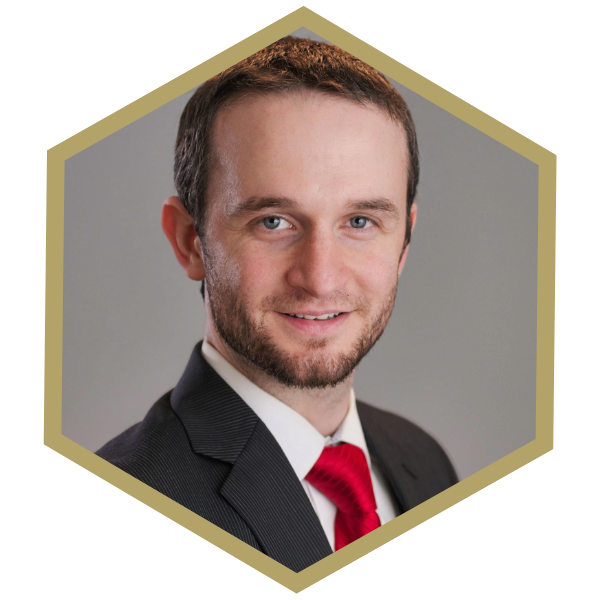
Usayd Casewit
Program Officer at The National Academies of Sciences, Engineering, and Medicine
Read Usayd's Profile
M.S. Energy and Environmental Policy
1. What's the best part about working in D.C.?
One of the most exciting aspects about working in Washington, D.C., for most of my career has been the access to a truly international community. Every day, you can encounter an incredible variety of perspectives, backgrounds, and experiences that challenge the way you think and work.
2. What's the most impactful part of your job?
In my role at the U.S. National Academies, having the privilege to support the development of the science and research ethos in at-risk and difficult contexts is the most impactful and rewarding part of my work.
3. Why are you passionate about it?
I think one of the keys to developing and sustaining positive passion in a job is being able to think of what you do for a living as an opportunity to contribute positively to the world in your own small way, share your knowledge and experience, continue learning, and do the best that you can. In my career, being part of efforts to address critical global issues through collaboration, development, finance, technical assistance, data-driven evidence, and authoritative advice has sustained my passion for my work.
4. How did your IAC degree prepare you for where you are now?
The M.S. in Energy and Environmental Policy I earned from IAC and the Georgia Tech School of Public Policy came at a pivotal time for me on both professional and personal fronts. My degree provided the foundational knowledge I needed to progress in my field and the kind of Georgia Tech grit you need to give you the best chance to lead a fulfilling professional life. The quality of instruction, the emphasis on professor-student relationships, the caliber of opportunities offered, the leaders who gave me a chance, and the courses you can take — it was all transformative for me. An IAC degree is not just a couple extra lines on my resume but has been a springboard for career and personal growth.
"It's my responsibility to ensure that we're working on the right issues today to inform decisions that will be made tomorrow. Pulling all of that together to advance the national security interest of the United States is where I believe I have the most impact."
— Scott Bray
Deputy Director of Naval Intelligence and Director of Naval Intelligence Activity at the U.S. Navy

Sara Cronan
Advancement Associate for Prospect Management at the Smithsonian National Air and Space Museum
Read Sara's Profile
B.S. Applied Languages and Intercultural Studies
1. What's the best part about working in D.C.?
D.C. has a distinct energy that makes me feel absolutely at home. The city is brimming with a diverse mix of languages, cultures, and backgrounds. Plus, there are so many free museums and public events to enjoy!
2. What's the most impactful part of your job?
I am fortunate that most of the impact of my job is tangible. I work in the Smithsonian National Air and Space Museum's Office of Advancement, where we serve as a bridge between the museum's donors and the opportunities they fund. When a donor makes a gift supporting a new exhibit, I get to see that exhibit constructed and brought to life. When someone funds an education program, I get to see the curiosity on the faces of students or families who participate in the experience.
3. Why are you passionate about it?
This line of work fits well with my mission-driven personality. First and foremost, I enjoy getting to know the wonderful donors and their individually unique reasons for supporting the Smithsonian. I am also a strong believer in the Smithsonian's mission and the service it provides in today's society.
4. How did your IAC degree prepare you for where you are now?
Aviation and spaceflight play a major role in the culture and identity of our nation. The tagline of Ivan Allen College during my time there was "Innovation at the crossroads of humanities, social sciences, and technology." Being a liberal arts student at an engineering school taught me how to thrive in this intersection — which is perfect for working at one of the Smithsonian's most visited STEAM-related museums!

Tara Murphy Dougherty
CEO at Govini
Read Tara's Profile
B.S. International Affairs
1. What's the best part about working in D.C.?
No matter how long I have been in D.C., I am still awestruck by the nation's capital. It represents the democratic ideals upon which we were founded, and seeing the monuments on a daily basis is an important and rewarding reminder of why I decided to work in national security in the first place.
2. What's the most impactful part of your job?
On a daily basis, I have the benefit of interacting with civilian and military users of Govini's software and data, who are increasing the competitiveness of the United States in a fraught geopolitical international environment. Knowing that our technology increases America's edge in this sophisticated techno-military competition is incredibly meaningful to me.
3. Why are you passionate about it?
From the time I was just a freshman living in Brown residence hall, I knew I wanted to use my Georgia Tech education to find a career that would allow me to be a part of something bigger than myself. I believe passion is so important in living life with meaning. For me, much of that passion relates to U.S. national security and using American power to make the world a better and safer place for humanity and our planet.
4. How did your IAC degree prepare you for where you are now?
It is not an understatement to say that I would not be where I am today without my international affairs degree from Georgia Tech. As a student, my favorite subjects were calculus and French — a non-obvious pairing for any degree program! Except at Georgia Tech, where I could immerse myself in international affairs and foreign languages, all while studying technical subjects, including computer science, that ended up providing an enduring path for a future career in the intersection of defense and technology.

Emily Fort
Acting Deputy Chief at the National Climate Adaptation Science Center
Read Emily's profile
M.S. Public Policy
1. What's the best part about working in D.C.?
There are so many wonderful opportunities, fun things to do, and great people — not to mention the food!
2. What's the most impactful part of your job?
Helping resource managers make climate-informed decisions regarding the management of public lands and cultural resources.
3. Why are you passionate about it?
I love my job, my team, and the people I work with. Personally, gardening with native plants, cooking, and fostering kittens are my passions.
4. How did your IAC degree prepare you for where you are now?
IAC gave me a great set of hard and soft skills that have supported my work with various federal agencies and becoming a leader of amazing people.
As a student, my favorite subjects were calculus and French — a non-obvious pairing for any degree program! Except at Georgia Tech, where I could immerse myself in international affairs and foreign languages, all while studying technical subjects, including computer science, that ended up providing an enduring path for a future career in the intersection of defense and technology."
— Tara Murphy Dougherty
CEO at Govini

Gunjan Gautam
Senior Energy Specialist at the World Bank
Read Gunjan's Profile
M.S. Public Policy
1. What's the best part about working in D.C.?
I work at the World Bank, which is a multilateral development bank and one of the best organizations working on international development. I work in South Asia on energy projects with government agencies and electricity utilities. D.C. offers opportunities to work with public sector organizations that have enormous positive impacts on the lives of millions of people. D.C. is also a diverse city where experts from many sectors and cultural backgrounds work together to solve problems.
2. What's the most impactful part of your job?
The South Asia Energy Unit of the World Bank, where I work, provides loans and grants to governments and utilities to build energy infrastructure projects. The hydropower, solar, transmission, and distribution projects developed with World Bank financing provide sustainable, reliable, and affordable electricity to millions of people. I currently work in Pakistan on the Tarbela Fifth Extension Hydropower Project, which will generate 1530 mega-watts, and on the Dasu Hydropower Project, which will generate 5.4 giga-watts when it is completely built. These projects help in transitioning to sustainable energy while supporting economic growth. Before this, I was working on rehabilitating the largest hydropower project in Afghanistan.
3. How did your IAC degree prepare you for where you are now?
The School of Public Policy at Georgia Tech gave me the opportunity to graduate with an M.S. in Public Policy with an energy concentration. I was a graduate assistant to Paul Baer, an expert in climate change negotiations and a free-thinker. The School of Public Policy is a research school. I learned the theories of policy analysis and policy processes, quantitative and qualitative methods for research, and the practical application of policy analysis in energy. My earlier training was in electrical engineering. The M.S. in Public Policy helped me understand the social sciences, including economics and public finance, and trained us in "structuring the problem" or analytic thinking. The School's top-notch faculty and culture allow you to think and question freely and equip you with knowledge resources, research methods, and tools. Two years at the School of Public Policy at Georgia Tech were amazing.

Nekabari Goka
Principal, Corporate Strategy at Exelon
Read Nekabari's Profile
M.S. International Affairs
1. What's the best part about working in D.C.?
I think that the best part about working in D.C. is the proximity to so many practitioners and policymakers from all parts of the world — very akin to living at the United Nations.
2. What's the most impactful part of your job?
I think that the most impactful part of working for a utility company is that the services we provide — the transmission and distribution of electricity and natural gas — represent the very backbone of the entire global economy. There aren't that many industries that can make that claim.
3. Why are you passionate about it?
At heart, I'm most passionate about improvement — improvement of how we interact with not only each other but also with the physical world around us more generally. And I think working in the utility industry (and the energy sector more generally) has been a fulfilling way to pursue that passion in a way in which all can benefit.
4. How did your IAC degree prepare you for where you are now?
More than anything, my degree from Ivan Allen College taught me how to think about problems more critically before rushing hastily into developing solutions. As I've grown in my career, this skill has proven to be invaluable.

Blake Holley
Senior Cyber Analytics Specialist and Lead SOAR Engineer at The Walt Disney Company
Read Blake's Profile
B.S. International Affairs
1. What's the best part about working in D.C.?
Actually, I've worked in Reston, Virginia, for the entire four years I've lived here. Only one of those years was in an office. The remainder has been working remotely from home.
2. What's the most impactful part of your job?
I built out a SOAR (Security Orchestration, Automation, and Response) program for a Fortune 60 company with a massive global and technological footprint.
3. Why are you passionate about it?
I really don't like inefficient processes. It bothers me to hear how people spend so much time doing boring, repetitive tasks that computers can do just as well, if not better, and then the people don't have sufficient time to perform the analysis parts of their jobs. By automating security processes, I give people more time to perform "human" tasks, such as analysis, while the computer handles the boring, repetitive tasks.
4. How did your IAC degree prepare you for where you are now?
Being at Georgia Tech, in general, gave me an appreciation for technology that other schools would not have. This allowed me to teach myself to code. At first, I applied those coding skills to INTA-focused open source intelligence work, which led me into the cyber threat intelligence field via language skills and regional specialties.
"More than anything, my degree from Ivan Allen College taught me how to think about problems more critically before rushing hastily into developing solutions. As I've grown in my career, this skill has proven to be invaluable."
— Nekabari Goka
Principal of Corporate Strategy at Exelon
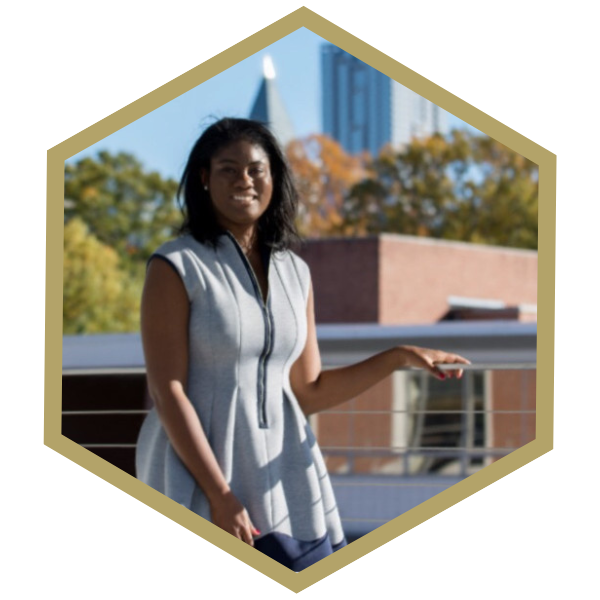
Kayla Kelly
Secondary Math Teacher at D.C. Public Schools; Educational Consultant
Read Kayla's Profile
B.S. Economics
1. What's the best part about working in D.C.?
I am a native Washingtonian, so one of the best parts about working in D.C. is that I am able to serve a community that I grew up in and inspire the next generation of Washingtonians. In addition, I also take pride in the fact that I work for a city that promotes diversity and inclusion and that I get to interact with a variety of different individuals who come from various racial, cultural, and religious backgrounds that are different from mine.
2. What's the most impactful part of your job?
I am a 12th-grade probability & statistics and precalculus teacher in D.C. Public Schools (DCPS). In addition, I am a math curriculum writer, and I privately tutor students in grades three to 12 who struggle in math. In my role, I find that the most impactful part of my job is the fact that I make mathematics accessible and fun to my students and that my students (who are of Black and Latinx descent) can see that someone who comes from a similar background as them can achieve success in a field that is majority white and male-dominated.
3. Why are you passionate about it?
My passion for education stems from my aunt, Theresa Kelly, who has taught within DCPS for 40 years as an elementary school teacher and literacy coach. She, along with my mother, Brenda Kelly (a retired D.C. government and federal employee), instilled the importance of serving one's community and promoting the importance of education. Because of them, I strive every day to be the best educator I can be because I have a passion for improving the educational outcomes within my community. I believe that when a community becomes more educated, the community as a whole begins to strive.
4. How did your IAC degree prepare you for where you are now?
I received a B.S. in Economics from IAC. As an econ major, I received extensive math training (specifically in data analysis and calculus), which allotted me the skills to teach advanced mathematics today. In addition, because economics is a social science, I was able to study other subject matters that did not pertain to STEM, which caused me to develop my writing and interpersonal skills, which are both necessary skill sets to be an effective teacher. Last, my economics degree allowed me to see how math can be interdisciplinary, which has allowed me to teach from a lens that math can be used to make sense of all subject matters, not just STEM-specific ones.
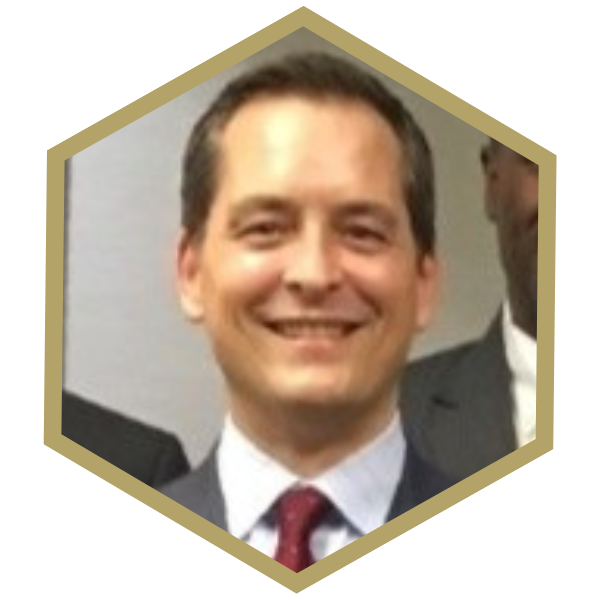
John Koogler
Branch Chief, Global Programs and Policy at the Bureau of International Narcotics and Law Enforcement Affairs
Read John's Profile
M.S. International Affairs
1. What's the best part about working in D.C.?
D.C. has a particular draw as the place where all the elements of U.S. global power and influence are tangibly distilled in the buildings and institutions that blanket the city. I love that there are so many people in such a small place engaged in amazing and interesting work. Within a few blocks of my office are leading think tanks on security and development, major international organizations, dozens of federal agency headquarters, and the White House. You see the Capitol Building and Washington Monument while running errands, and my next-door neighbors include NASA engineers who manage space missions, senior Hill advisors, and civil society professionals combating environmental crimes around the world. At the same time, the city is protective of its identity and legacy residents, so it retains a feel of "D.C.-ness" among the constant influx of new people.
2. What's the most impactful part of your job?
Working for the State Department in the Bureau of International Narcotics and Law Enforcement Affairs, I feel fortunate to have the mandate and the resources to substantively engage on functional topics at the forefront of U.S. national security and foreign policy priorities. I oversee three teams dedicated to countering transnational corruption, cybercrime, and money laundering. A central part of my job is providing the financial and organizational support of the U.S. government to push back on these things, and we're able to see concrete examples of our effectiveness. I am able to convene experts from U.S. agencies, academia, the private sector, civil society, and international organizations to take an entrepreneurial approach to complex, nuanced issues and work with these partners to prevent and combat these crimes. In addition to our programs, I was proud to be the U.S. government lead in co-hosting with Transparency International the 20th International Anti-Corruption Conference in Washington, D.C., in December 2022.
3. Why are you passionate about it?
I was drawn to this position because I see these issues as fundamental to the issue of fairness and opportunity — corruption saps resources from citizens, denying them services and opportunities to improve their lives; cybercrime targets the vulnerable through things like online scams, ransomware, human trafficking; and money laundering enables individual criminals and criminal organizations to profit from their crimes. Justice and ethics are issues that have always been extremely important to me; people's lives and opportunities shouldn't be dictated by the greed of others, and there should be protections against rapaciousness, particularly when targeting vulnerable communities. I recognize all countries, absolutely including the U.S., have their own legacies on these issues. However, I am proud of the Department's approach to engaging in these conversations with humility — recognizing our own shortcomings while working collaboratively to address these challenges.
4. How did your IAC degree prepare you for where you are now?
I followed a bit of an unconventional path to get where I am and didn't attend IAC for my graduate degree until I was 29. I had been out of the field for several years, so I was seeking to hone and develop new skills and bring my existing skills into sharper focus. My time there was indispensable as a launch point for a career field I had always focused on pursuing. IAC has the best of two worlds — there is a small college community where professors are approachable and available, and the class size facilitates substantive discussion and inquiry. At the same time, it is nested within a large renowned university with the resources and opportunities that affords. I spent many hours with Professors Woodall, Weber, and Stulberg, whose graciousness with often unannounced visits (apologies!) broadened my horizons and initiated lines of thought that I'm still following today. Through Tech's academic requirements, I was introduced to tools like ArcGIS, STATA, and SPSS, whose functions I would not have otherwise learned but which have enabled me to identify a host of opportunities and converse with a much broader spectrum of experts across disparate fields.

John Krzyzaniak
Research Associate at the Wisconsin Project on Nuclear Arms Control
Read John's Profile
M.S. International Affairs
1. What's the best part about working in D.C.?
I work broadly on foreign policy related to Iran. Even though it's a niche area, there are many brilliant people who work on the same thing and are eager to meet up, collaborate, and share knowledge. No other city offers those kinds of networking opportunities in my line of work.
2. What's the most impactful part of your job?
I get to see officials at the State or Commerce Departments use my work products directly.
3. Why are you passionate about it?
It may sound corny, but I genuinely want to help the U.S. government make sound foreign policy and avoid some of the costly mistakes of the past. If my specialized knowledge or skills can be useful to policymakers, I'm eager to offer them.
4. How did your IAC degree prepare you for where you are now?
It's safe to say I wouldn't be working in international affairs and foreign policy at all if it weren't for my Nunn School degree. It opened so many doors and gave me the foundational knowledge I needed to get started in the field.
"It's safe to say I wouldn't be working in international affairs and foreign policy at all if it weren't for my Nunn School degree. It opened so many doors and gave me the foundational knowledge I needed to get started in the field."
— John Krzyzaniak
Research Associate at the Wisconsin Project on Nuclear Arms Control

Alex Little
Development Assistant at the Cato Institute
Read Alex's Profile
M.S. Global Media and Cultures (Russian)
1. What's the best part about working in D.C.?
My favorite part of working in D.C. is the access to interesting events related to domestic and foreign policy issues. In addition, I have had the opportunity to meet scholars I admire and ask them questions about my projects.
2. What's the most impactful part of your job?
Relaying developments in policy work at Cato to donors has been a fascinating and impactful experience. I enjoy utilizing my passion for policy to inform those that support the Cato Institute about the impact Cato has on policymaking in Washington.
3. Why are you passionate about it?
I am passionate about my work at the Cato Institute because I believe that Cato's policy suggestions empower people and allow them to live freer and happier lives.
4. How did your IAC degree prepare you for where you are now?
My global media and cultures degree gave me the academic and professional knowledge and skills to work in the policy realm with confidence and competency.
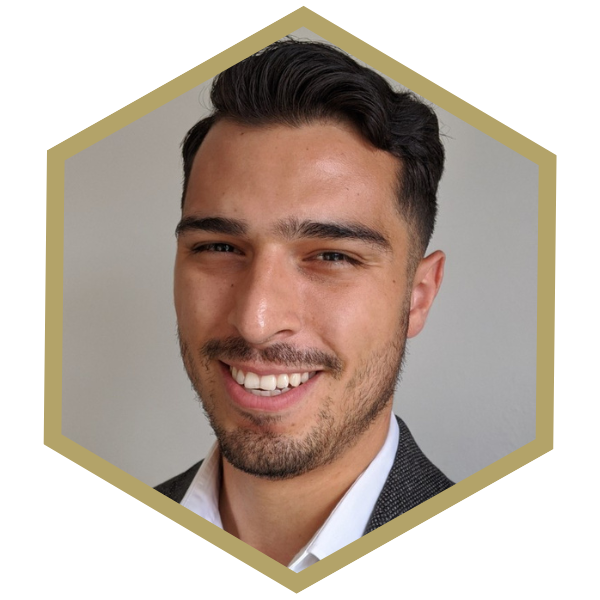
Andres Marcuse-Gonzalez
Recruiter at Democracy Fund
Read Andres' Profile
B.S. & M.S.
International Affairs
1. What's the best part about working in D.C.?
For context, I worked in D.C. for several years before moving to Richmond, Virginia, where I currently reside. With that said, my current role is based in D.C., and I come into the office several days every month. Without a doubt, the best thing about working in D.C. is the energy and purpose that everyone brings. It's easy to focus on the flashier jobs in D.C. and ignore the less flashy roles — the accountants, comptrollers, fundraisers, H.R. and operations professionals, and analysts that work in the background of every major institute and organization in the city. But the reality is that these roles are critical, and nothing gets done without them. Thankfully, everyone I've met in these types of roles brings a real passion for the work and an understanding of how they are helping move the needle toward a better society.
2. What's the most impactful part of your job?
I love that I get to change how we evaluate and pursue talent. The democracy field has struggled to retain talent in recent years, and one of the big reasons it has failed to replace the talent it has lost is that it's been looking in all the wrong places. By bringing a competency-based approach that centers equity and ensures that lived experience is valued alongside professional experience, I am helping the democracy field tap new sources of talent that will inevitably enrich and strengthen the field in the long run.
3. Why are you passionate about it?
When I was trying to break into the D.C. non-profit world, I found that many workplaces tended to hire people based on the connections they had rather than the competencies they brought to the work. It made for an incredibly challenging environment, and since then, I have been motivated to create pathways for talented individuals from all walks of life to have a voice at the table and make a real impact. Equality of opportunity is not something that comes about naturally. It needs strong-willed individuals working towards it, and I'm excited every day to be one of those individuals.
4. How did your IAC degree prepare you for where you are now?
The big thing that an IAC degree brings is a focus on professionally transferable skills. In addition to the content knowledge around democracy and human rights that I acquired as an IAC student, I also developed real skills that can be applied to a professional environment — the ability to apply a systems lens to a work environment and develop new processes that contribute to a team's efficiency is something that is unique to an IAC degree and which I actually don't feel I see enough of as a recruiter in the non-profit space. Time and time again, I have seen candidates who bring incredible academic credentials but display little-to-no ability to contribute to a professional team; Georgia Tech and Ivan Allen College regularly produce alumni who vault over that pitfall as candidates.

Ishan Mehta
Legislative Assistant at the U.S. Senate
Read Ishan's Profile
M.S. Public Policy
1. What's the best part about working in D.C.?
You have the opportunity to work on a variety of issues and a much better chance of having a say in your office or organization's final decision. You also get the opportunity to connect and build relationships with a lot of kind and smart people who all share similar reasons for being in D.C.
2. What's the most impactful part of your job?
Working for Congress gives you a real opportunity to contribute to the public good. You get to interact with and influence leaders in every sector. Someone once described it to me as, "you can open the newspaper to any page, and you and almost every headline will have a public policy issue that you or your colleagues can have an impact on."
3. Why are you passionate about it?
Even though people believe we are in cynical times, there is a lot of good work being done. If you are successful, you can improve the lives of millions of people. It's very easy to be passionate about that kind of work.
4. How did your IAC degree prepare you for where you are now?
I use skills or knowledge I learned in my classes almost every day. Through my research work, I had the chance to connect with other prominent folks in my field, connections that have helped me when I got to D.C. and later on.
"Equality of opportunity is not something that comes about naturally. It needs strong-willed individuals working towards it, and I'm excited every day to be one of those individuals."
— Andres Marcuse-Gonzalez
Recruiter at Democracy Fund
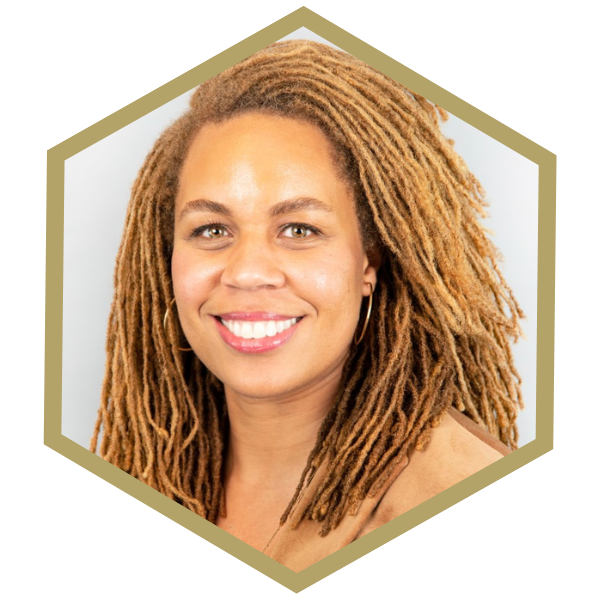
Nyema Mitchell
Vice President at Jobs for the Future
Read Nyema's Profile
M.S. Public Policy
1. What's the best part about working in D.C.?
While DC is often associated with politics, I have come across so many people with varied careers and career paths.
2. What's the most impactful part of your job?
I am passionate about working for Jobs for the Future because it is an organization driving real change across the country in education and workforce systems.
3. Why are you passionate about it?
I'm passionate about it because I believe that for far too long, we failed several populations of people and excluded them from opportunities for economic advancement.
4. How did your IAC degree prepare you for where you are now?
My IAC degree prepared me to examine some of society's biggest challenges and collaborate with others to identify potential solutions.
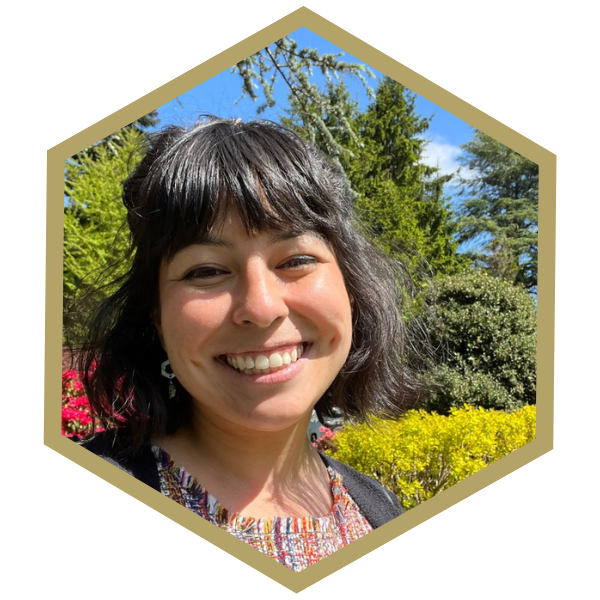
Marcela Moreno
Transportation Planner at the Metropolitan Washington Council of Governments
Read Marcela's Profile
B.S. History, Technology, and Society
1. What's the best part about working in D.C.?
The best part about working in D.C. is being able to live in D.C.! I am lucky to have met some really cool people who are up to exploring the museums, volunteering, or doing other "cup-filling" activities. One of my favorite parts about working and living here is the yoga community I volunteer at. There is always something to do, learn about, or see! Generally speaking, I think this area is really mentally enriching and has a lot of opportunities to grow personally and professionally.
2. What's the most impactful part of your job?
I am a transportation planner at the Metropolitan Washington Council of Governments, which houses the Transportation Planning Board (TPB). TPB is the metropolitan planning organization for the Washington metro region, and my specific role focuses on public participation. I get to work with the communities across the Washington region to ensure their voice is heard in the long-range planning process (our next plan is a vision for 2050!). I think this role is impactful because you have the opportunity to break down barriers to participation and educate people about transportation planning processes.
3. Why are you passionate about it?
I'm passionate about my work because transportation impacts virtually everything in our lives. It's important to me to empower people to know about the planning process and where they can use their voices to advocate for themselves and their community. Transportation projects take time! I recently read an article that Millennials and Gen Z drive much less than older generations — so it's important that we act now for the future that we want in 10 or 20 years. It matters for being able to age in place, to ensure that infrastructure becomes more accessible, and that people have reliable access to affordable housing, jobs, healthcare, or the things that they want to do.
4. How did your IAC degree prepare you for where you are now?
I studied history, technology, and society when I was an undergraduate. My IAC experience prepared me for my career by challenging me to turn technical information into something understandable and even actionable. As a planner, I believe it's important to understand the context in which planning decisions exist. To plan for the future, you need to understand past decisions or planning processes and how they may have harmed communities or how they did not meet our needs. We need to learn from the past to make better decisions for the future. So in transportation planning, it's important to couple qualitative and quantitative information to make a decision. IAC, I think, prepared me to use both types of research for better decision-making.

Amira Mouna
Founding Partner at The Menges Group
Read Amira's Profile
B.S. International Affairs
1. What's the most impactful part of your job?
As a consultant focused on the Medicaid program, my career is centered around how we can improve Medicaid. Every day, I get to work alongside my colleagues to innovate and encourage change around improving access to health care, improving health outcomes, and challenging the status quo. Additionally, my project work has allowed me to help clients grow across many states and has supported the creation of hundreds of jobs.
2. Why are you passionate about it?
Medicaid covers over 20% of the U.S. population. The Medicaid population faces so many healthcare challenges related to healthcare access, equity, and social needs — I feel grateful to have a career focused on trying to make meaningful change in improving health outcomes for these beneficiaries.
3. How did your IAC degree prepare you for where you are now?
When I started at Georgia Tech, I planned to go to medical school. Right before my senior year, I had the opportunity to conduct research with Professor Kosal and uncovered my passion for policy — which ultimately changed my career trajectory. I decided to pursue a graduate degree in health policy shortly after graduation. I feel fortunate to have had many diverse learning and networking opportunities at Georgia Tech that led me to my career.
"To plan for the future, you need to understand past decisions or planning processes and how they may have harmed communities or how they did not meet our needs. We need to learn from the past to make better decisions for the future."
— Marcela Moreno
Transportation Planner at the Metropolitan Washington Council of Governments

Adam Owens
Chief of Staff, Global Public Policy at General Motors
Read Adam's Profile
M.S. International Affairs
1. What's the best part about working in D.C.?
The best part of it is getting to watch history being made in real-time. Whether that's tracking votes to see if a key piece of legislation that will reshape parts of the economy gets passed or helping shape discussions happening in the White House and Pentagon about a major geopolitical issue, you really do get a front seat in watching, and sometimes shaping, what historians will one day write about. The other great part, in my experience, has been that D.C. jobs really do add new meaning to the phrase "every day is different." Issues in D.C. are so dynamic that your responsibilities and the issues you work on are constantly changing. For me, that's been great because I like the excitement when things are always a little unpredictable.
2. What's the most impactful part of your job?
The most impactful part of my current job is shaping and guiding the public policy strategy for one of America's most historic companies, General Motors (GM), and seeing that strategy yield successes that truly are reshaping the American and global automotive sectors.
3. Why are you passionate about it?
I've always loved cars, so being able to work in the industry at such a pivotal point in the auto sector's history is a huge accomplishment. And I've always loved international affairs, so combining my love of cars and international affairs into various roles at GM is huge for me. I'm also passionate about this work because I can contribute to GM's efforts to become the leading electric vehicle (EV) company in America and ensure that the American auto sector enjoys the same successes in the EV era as it did during the internal combustion engine era.
4. How did your IAC degree prepare you for where you are now?
My IAC degree was key to helping me become an effective translator between the technological/engineering world and the policy world. One thing I learned at Georgia Tech that is key to that translating ability is how to write for, and communicate with, policymakers and senior executives to present them with solutions and options. That has been vital to my success as an intelligence analyst, foreign policy advisor, and government affairs leader.

Sarah-Grace Parr
Director of Budget and Planning at Save the Children U.S.
Read Sarah-Grace's Profile
B.S. International Affairs
1. What's the best part about working in D.C.?
I love D.C. It's walkable, has an emerging food scene, and has a fantastic job market. Being an INTA major and now in the international development sector, the opportunities are endless. So many NGOs have offices or are based here, making it easy to settle down and become a member of the community while advancing your career through roles with varying organizations. It's a city where you can find a job that is perfectly tailored to your professional goals and needs.
2. What's the most impactful part of your job?
The most important part of my job is the people. I love that my work is (hopefully) having a positive impact on society.
3. Why are you passionate about it?
Working in international development has been life-changing. I was skeptical of the development sector and its effectiveness before graduating from Georgia Tech, but I ended up working on emergency food aid program management for USAID and realized the importance of humanitarian work. As a result, I've made it my career. I now work as the Director of Budget and Planning at Save the Children and find that budget management can really impact a project's performance in the field.
4. How did your IAC degree prepare you for where you are now?
My IAC degree specifically instilled perseverance in me. I had many ups and downs in College, and when I was in a slump, I learned how to get back on my feet and move forward with life. Maybe I didn't execute the assignment perfectly, but I was able to get through it. Learning to push through failing moments from time to time has given me me a great deal of resilience, for which I am grateful.
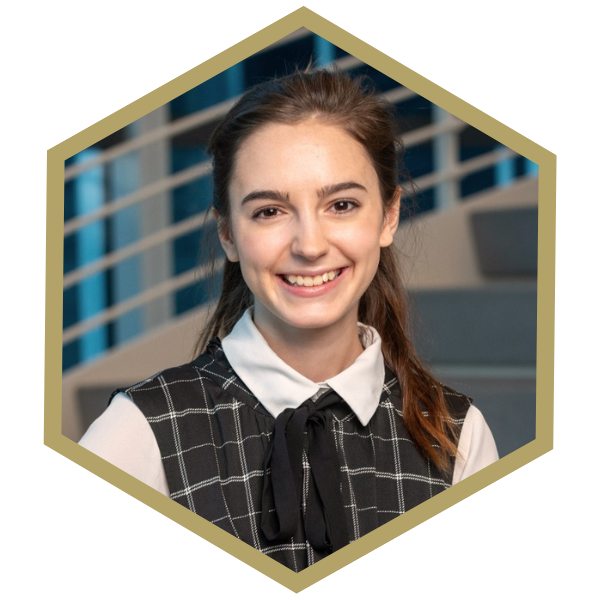
Taylor Poole
Intelligence Analyst at BSI Group
Read Taylor's Profile
B.S. International Affairs
B.S. Applied Linguistics and Intercultural Studies (Russian)
M.S. International Security
1. What's the best part about working in D.C.?
The people. Most professionals are passionate about their work, care about the communities they're serving, and want to make an impact. It seems like I learn something new every week about a different cause, whether it's a social issue like food insecurity or a political issue like electoral reform. Having access to an environment with such a high density of dedicated individuals is a great opportunity to learn more about the issues you care about, share ideas for solutions, and develop your career goals. Overall, D.C. is just a really inspiring environment for a young professional, particularly if you are interested in public service.
2. What's the most impactful part of your job?
As an intelligence analyst, I collect open-source data on security threats to supply chains in the Middle East, Africa, and Eurasia. This includes traditional security threats like terrorist attacks and unconventional threats like human trafficking. The data I collect goes into reports for private sector clients who want to protect their supply chains from exploitation by bad actors. So far, my favorite project has been collecting and analyzing data that identifies links between Russia's Wagner group, the war in Ukraine, and weapons smuggling to paramilitary organizations in Africa.
3. Why are you passionate about it?
I appreciate having the opportunity to make a difference, even a small one, in people's lives. If just one private sector company changes its policies based on my data, that means less human trafficking in the world and fewer smuggled weapons for bad actors.
4. How did your IAC degree prepare you for where you are now?
Ivan Allen College does a wonderful job of teaching students soft skills and technical skills. The team that hired me picked up my resume because of my ability to code and perform other types of data analysis beyond statistics. I also find that once I am hired for a job, the ability to translate between the tech and policy worlds has earned me competitive assignments despite being early in my career.
"I appreciate having the opportunity to make a difference, even a small one, in people's lives. If just one private sector company changes its policies based on my data, that means less human trafficking in the world and fewer smuggled weapons for bad actors."
— Taylor Poole
Intelligence Analyst at BSI Group

Conner Surrency
Project Lead, Counterproliferation Finance at CRDF Global
Read Conner's Profile
B.S. International Affairs
1. What's the best part about working in D.C.?
For me, the best part of working in D.C. is how tightly integrated the community is. Everyone here — be it in the policy community, think tanks, implementers, etc. — are always only a few degrees of separation apart. There is really no better place for those interested in international relations and security; the opportunity to work with experts and practitioners is abundant.
2. What's the most impactful part of your job?
At CRDF Global, managing U.S. government-funded programming means I get to directly implement U.S. foreign policy. Right now, that takes the shape of delivering capacity-building training on Russian sanctions. As foreign policy priorities shift, we also get to propose the very projects for funding that we end up working on.
3. Why are you passionate about it?
My current portfolio in international counterproliferation finance is particularly impactful for me, not only due to the international exigency but because I have dozens of coworkers still based in Ukraine throughout the war. More broadly speaking, my work allows me to travel and engage with key stakeholders in every region of the world, helping to build lasting bilateral relationships and cultivate local expertise.
4. How did your IAC degree prepare you for where you are now?
Before IAC, I had never traveled out of the USA, and I certainly had no grasp of international affairs. The faculty at the Sam Nunn School provided me with the foundational knowledge that allows me to work in this field today. Further, the opportunities for international study and collaboration with cross-cultural and cross-disciplinary students gave me the experiences required to build international partnerships successfully.
Fun fact: the legislation that brought my company, CRDF Global, into existence was the 1991 Nunn-Lugar Act, as in the Georgia Tech Sam Nunn School of International Affairs.

Dhanaraj Thakur
Research Director at the Center for Democracy and Technology
Read Dhanaraj's Profile
Ph.D. Public Policy
1. What's the best part about working in D.C.?
In D.C., we are part of many policy circles, specifically technology policy. This includes civil society, academics, industry, and, of course, government. It's a great space to be in and to be able to learn and understand the priorities of different groups when it comes to tech policy issues like privacy, content moderation, surveillance, etc. D.C. is also an international city which means there are many think tanks and policy organizations that work globally. And so, there are many opportunities to learn and share relevant research both specific to the U.S. and elsewhere.
2. What's the most impactful part of your job?
For me, that's having our research inform important policy debates and decisions. For example, our research was cited in an amicus brief presented at a recent U.S. Supreme Court hearing about intermediary liability on the internet. The decisions by the court in that case could have important ramifications for how the internet works. Our research has also been referenced and used by policymakers in Congress and the White House administration and cited in the academic literature. It's great to be part of a research team building evidence to inform important tech policy decisions.
3. Why are you passionate about it?
Aiming to design and implement research that can address important evidence gaps in tech policy debates and, at the same time, also be novel in terms of academic research is such a great and important challenge to address. To do that, we have to engage both policymaking and academic communities. It's great to be at the intersection of both those spaces and to be able to figure out what research is really the most useful for multiple audiences.
4. How did your IAC degree prepare you for where you are now?
My time at the IAC and Georgia Tech, in general, was great. More specifically, I completed my degree at the School of Public Policy, where I did several courses that helped build my career. These helped me learn about research agendas, methods, and what is policy-relevant research. More important were my fellow students and several professors. I am still in touch with a few and, in fact, continue to work with some of those folks that I first met at Georgia Tech. Those connections have helped me throughout my career in terms of continuing to learn after completing my degree, building my confidence, and continuing to see the value of critical research that can inform policy.
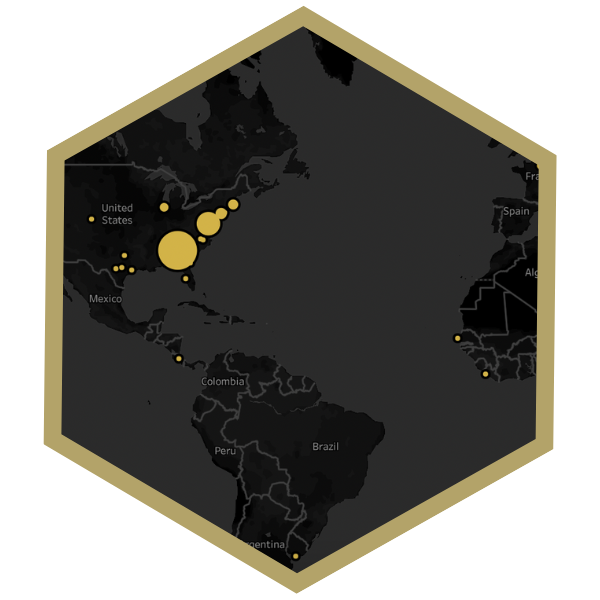
Explore More
See what our IAC alumni are up to around the world!
